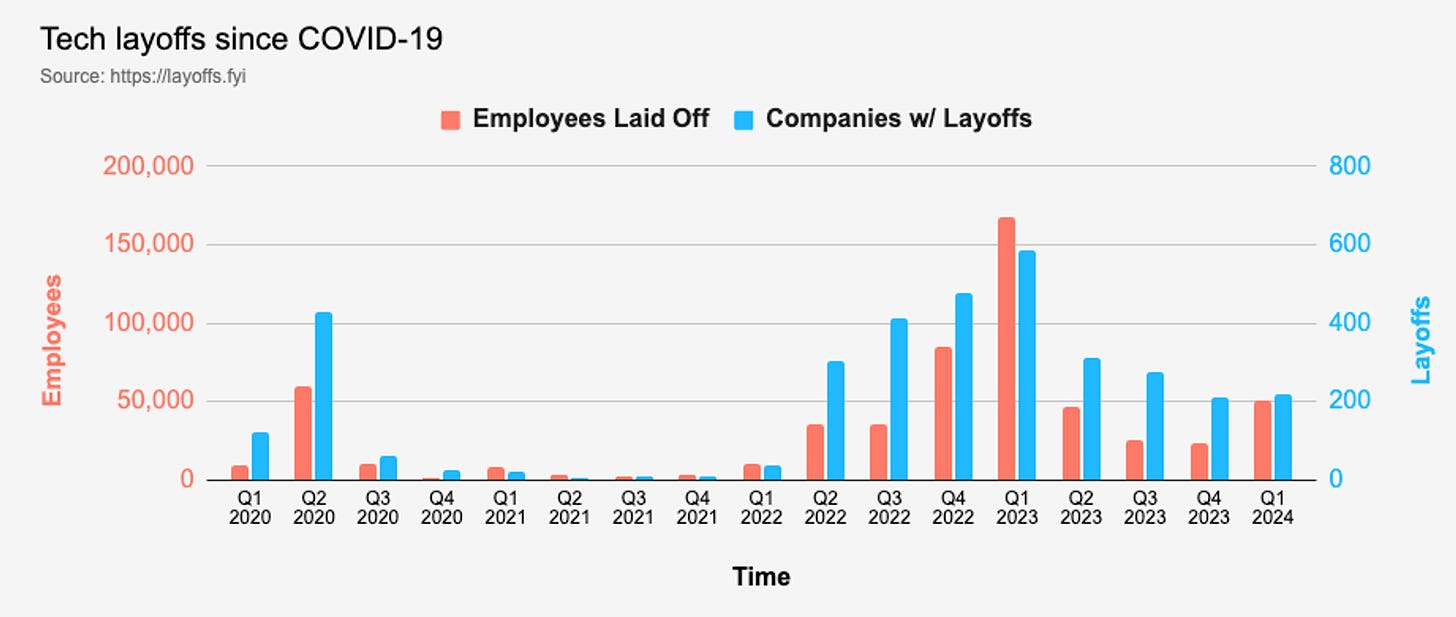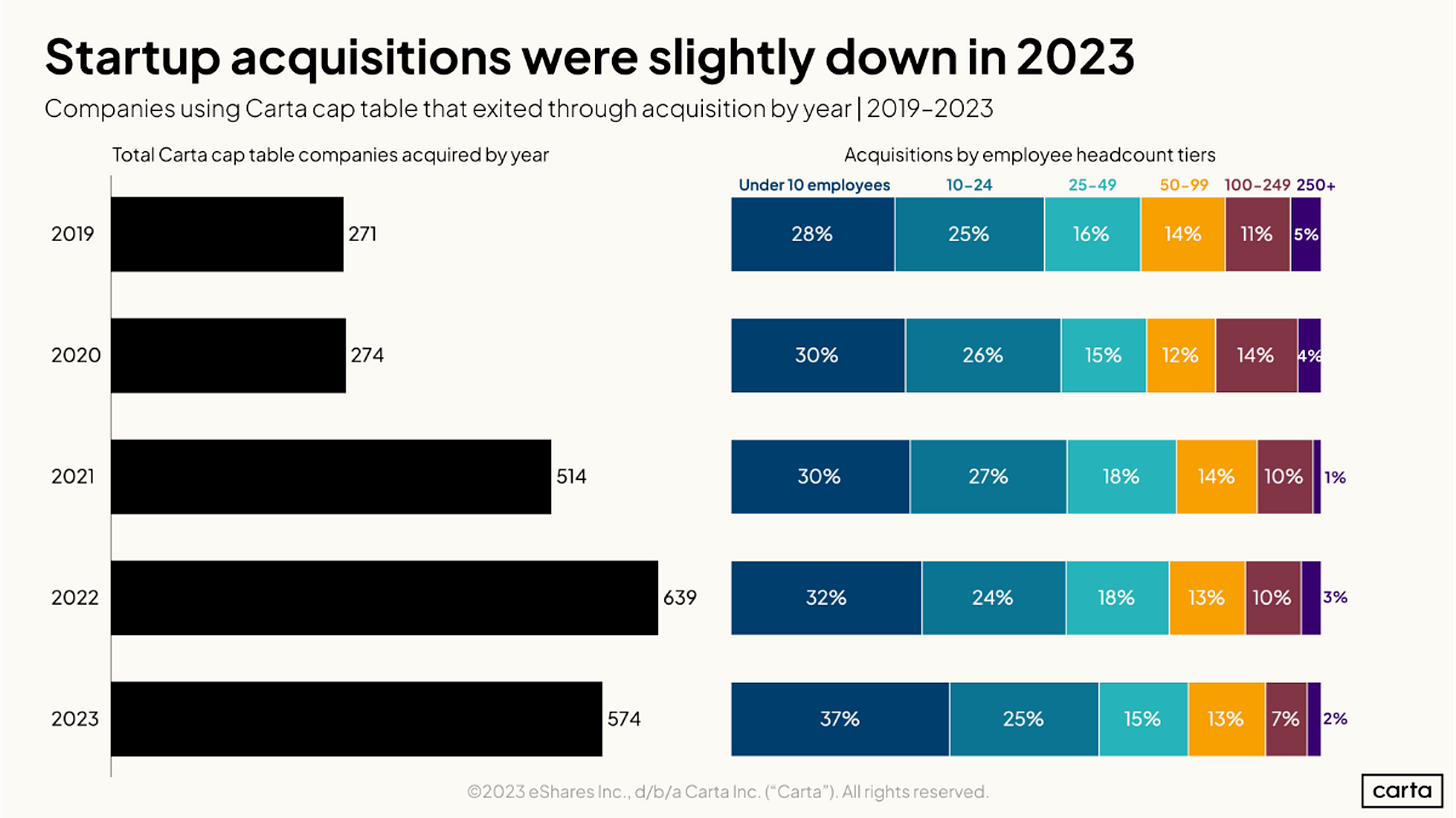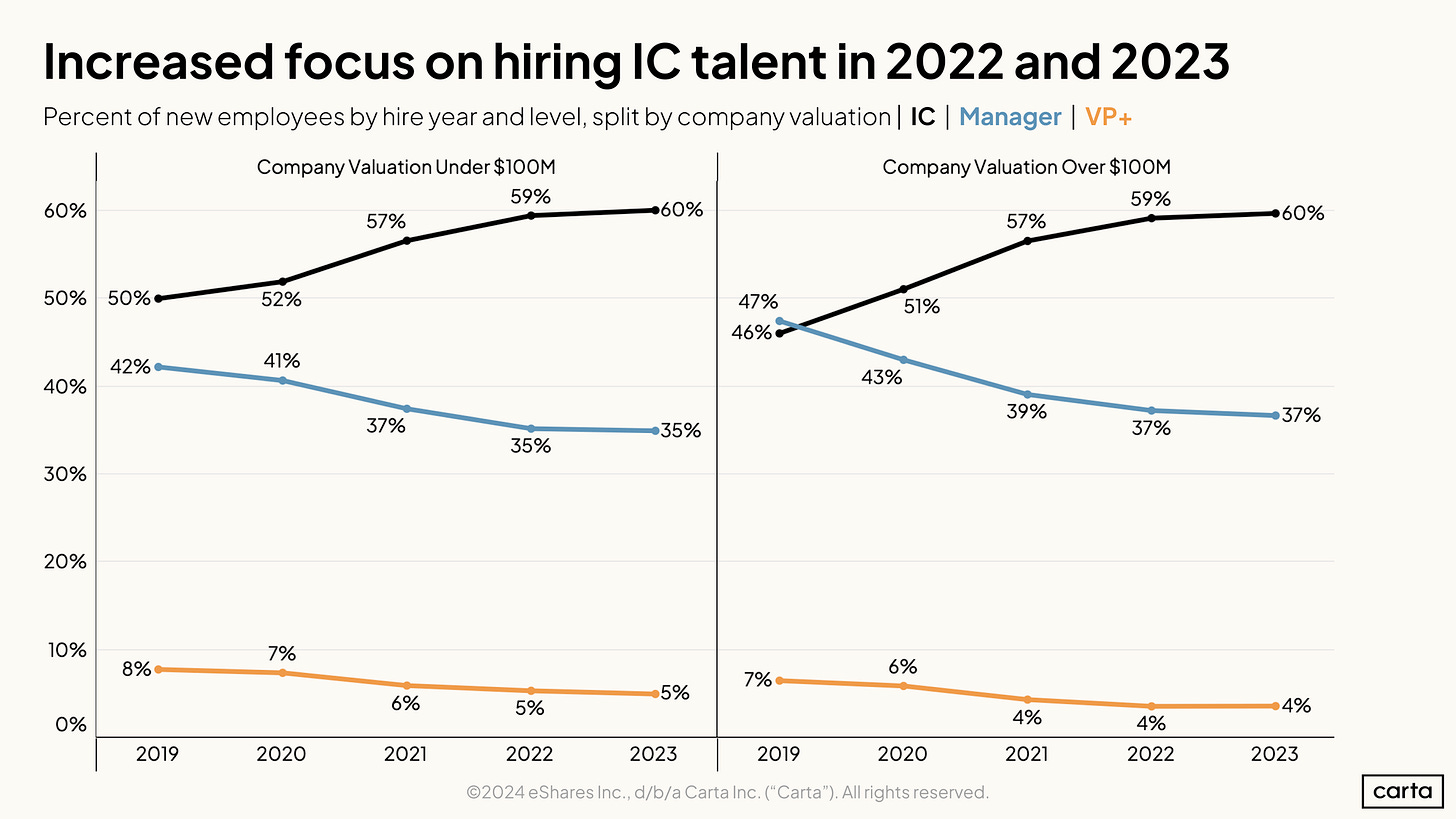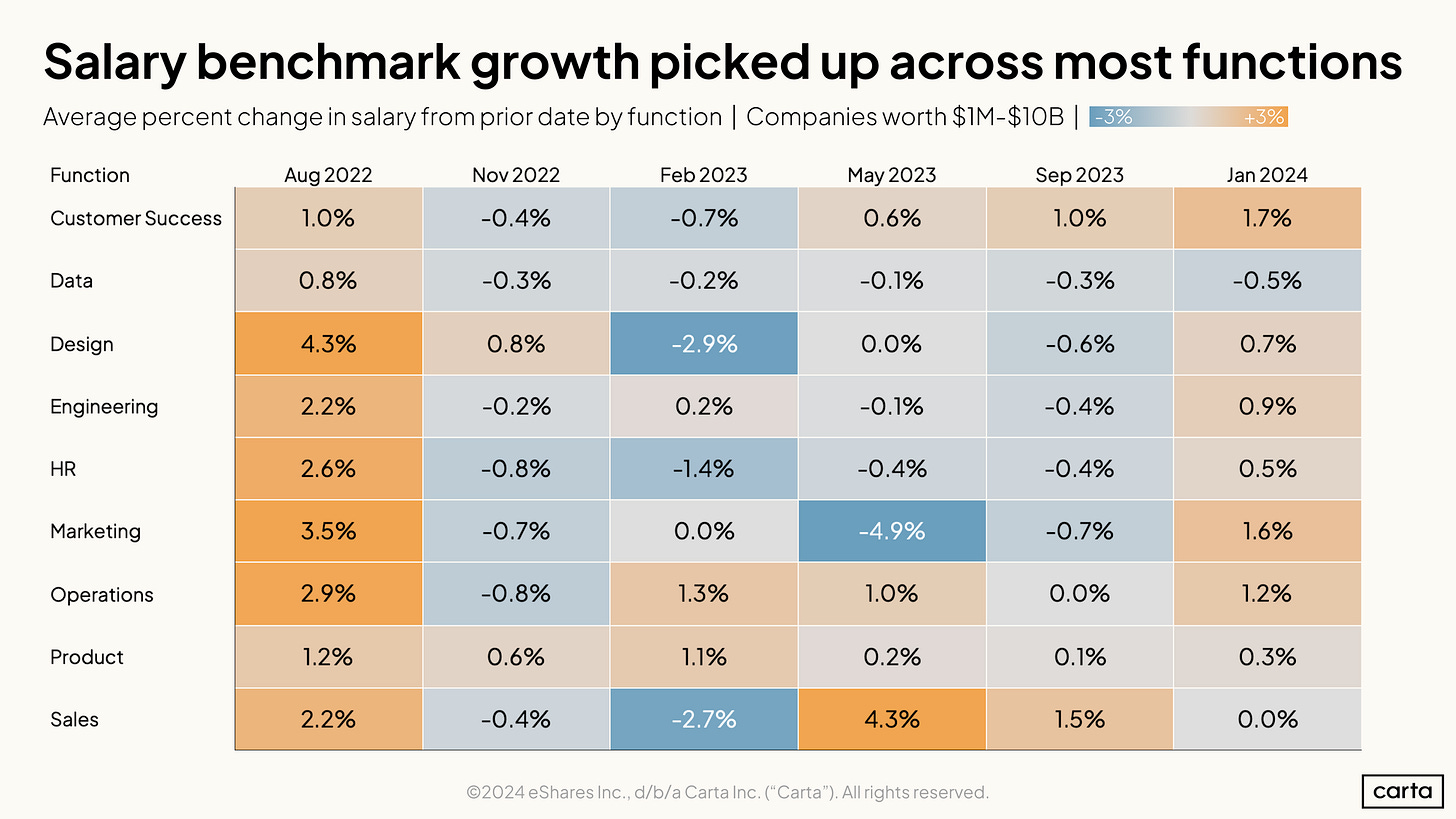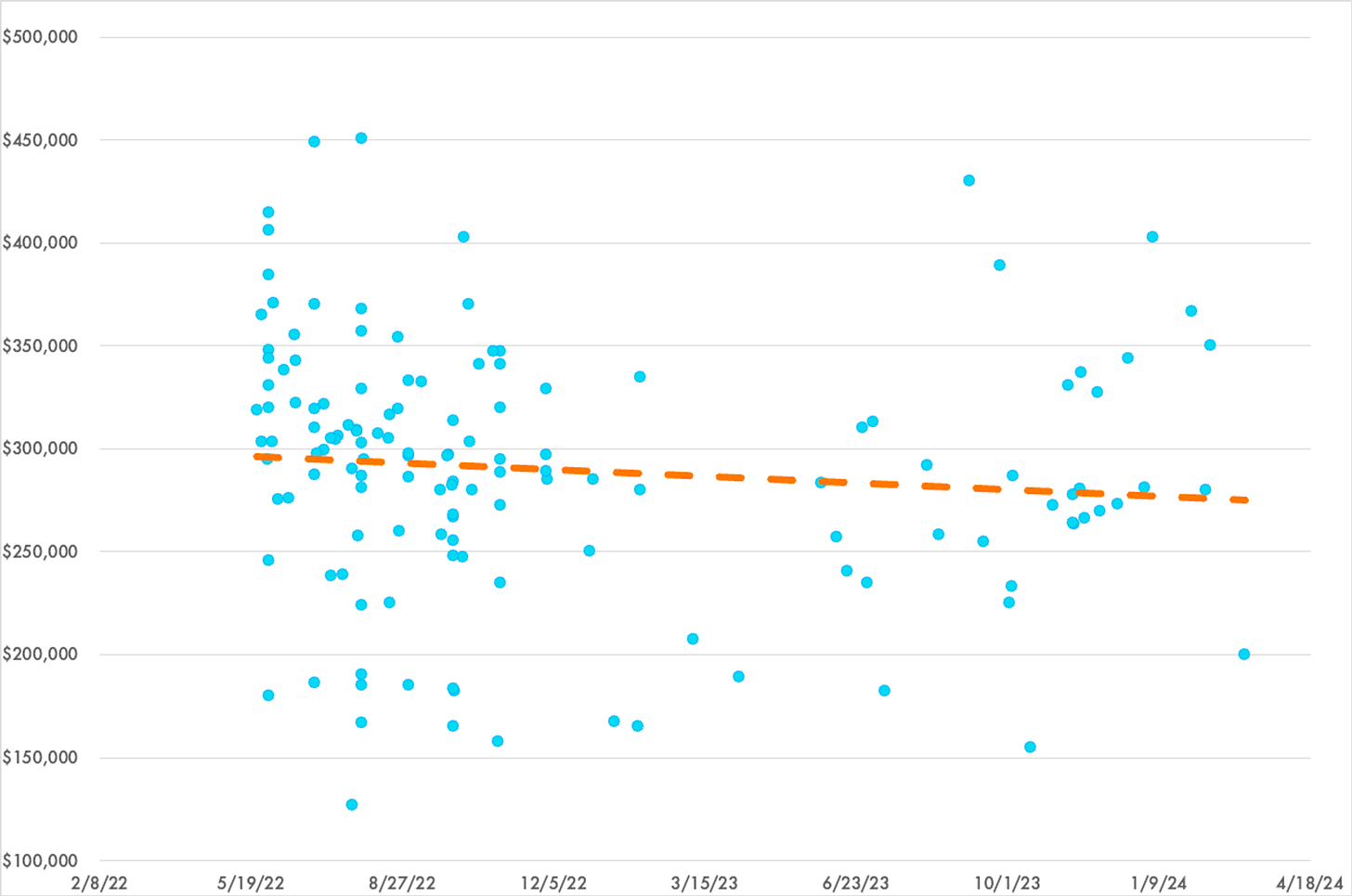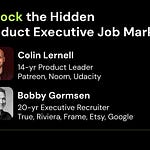Tech jobs and stocks are up, layoffs are down, and the first AI software engineer is spooking tech workers - all while there's a 60% chance of a broad recession.
As a tech professional, you might wonder what this means for your career. That's why I dove deep into the tech job market for you over the past 8 weeks, where I…
analyzed job market, compensation, and historical data
spoke with senior leaders in tech
and worked with actual candidates in the job search trenches.
What I discovered will hopefully help you understand:
The rollercoaster we're on
Where we're heading
and 5 lessons every tech professional like you should take away from all of this.
We'll deep dive into hiring, layoff, and compensation trends, and hopefully, by the end of this post, you'll have a clear action plan for your career or job search.
But first, I wanted to give you some historical context.
So, I turned to the senior leaders I've worked with, who have over 30 years of experience, to get a better understanding of the tech industry's past. As a Senior Director with over a decade in the industry, I know my view of history is limited.
Most of you know that the biggest tech boom and bust was way back in 2000, but it took inflation-adjusted markets a staggering 18 years to recover, and there was a major recession in 2008 before it was near 1999 levels again.
NASDAQ Composite Index of Tech Stocks 1995-2019
(inflation-adjusted, gray indicates recession)
Perspective is helpful, but for those of you hurt by today’s market, I want to share a story that might give you some hope.
Meet Ethan Evans. He was laid off from his engineering job in the 2003 bust with a new baby, a stay-at-home wife, and little savings early in his career.
He had to take a less-than-ideal job that required him to move his family to another city.
But eventually worked out—even better than he could have imagined. Ethan went on to become a VP of Engineering at Amazon during its biggest growth years.
Ethan’s story can hopefully give you some perspective. The road ahead might be bumpy, but with the right mindset and resiliance, you can still come out ahead.
Now, that awful decade and a half did make these tech veterans cry wolf a few times.
If you look at the inflation-adjusted NASDAQ charts, you'll see pullbacks in 2015, 2018, and 2020 that spooked them into calling another tech job recession every couple of years.
But guess what? The market came back, and back, and back again, hitting new heights each time.
2015 pullback in NASDAQ (inflation-adjusted)
2015, 2018, 2020 pullbacks
In fact, 2021 was the biggest boom of all, with hiring and compensation at an all-time high. You might have experienced this yourself - multiple offers and top candidates getting 2-3x the historical averages. It was a tech worker's dream come true.
2020 recession and 2021 recovery
Then came the fall.
Changing consumer behavior after lockdowns caused advertising and consumer tech to dip.
But the real trigger for the downfall was in March 2022 when the US Federal Reserve started raising interest rates to slow inflation.
As a tech professional, it's crucial to understand how this impacts your industry. Tech stocks are valued on their future growth, and interest rates discount that growth. So, when rates went up, valuations started dropping from all-time highs. As it became expensive to get money from investors or lenders, companies had to slow hiring, with many starting layoffs in early 2022.
Then, Elon bought Twitter and laid off over 80% of its staff, showing that deep cuts are possible. Zuckerberg knocked over the first of the FAANG layoff dominoes at Meta, leading even Google to lay off more people than they ever had.
NASDAQ drop in 2021/22
Both Zuckerberg at Meta and Sundar at Google have said that slow hiring and occasional layoffs will continue as they believe they can grow more efficiently.
Zuckerberg outright said:
“Higher interest rates lead to the economy running leaner, more geopolitical instability leads to more volatility, and increased regulation leads to slower growth and increased costs of innovation…Given this outlook, we'll need to operate more efficiently than our previous headcount reduction to ensure success"
And this is coming from the two companies who led the way in growing both tech hiring and compensation since the early 2000s.
What is really happening though is that they are entering a time of uncertainty. There is a huge opportunity for them to ride another major growth wave, but there is also a path for them to become slow-growth giants like past cycles.
As a tech worker, this means you need to be prepared for both scenarios. When these companies strike oil or when they feel threatened in an emerging area, they will eventually need to hire furiously, even if that means laying off in other areas of the business that aren't cash cows. Your job is to position yourself in the right areas and develop the skills that will be in high demand. That doesn’t mean you can 100% avoid layoffs, but you can build the experience to recover if you are affected.
So what specifically has changed in the job market over the past two years?
In 2023, Carta - the top startup equity platform - reported the first dip in startup employment in over five years.
Layoffs peaked in January 2023 with trueup reporting over 108,000 tech workers let go, while open jobs in tech dropped by 2/3rds, while new startup hires dropped 50% in 2023:
But here's an interesting observation: the new hire rate was about the same in 2019. This suggests that while the market has slowed down from the crazy heights of 2021, we're not in uncharted territory.
And if you look at the dips in total startup headcount, they're not nearly as dramatic as the massive growth seen in the past few years
So, what does this mean for you? People still have jobs, but the dynamics have shifted. Employees became scared to leave their unsteady jobs after seeing 1 out of 4 of their colleagues hired in 2022 not lasting a year - a 43% increase from the previous year. That's a scary stat, and it might make you think twice about jumping ship right now.
Plus, entry-level employees were 25% more likely to be cut, so if you're just starting out in your tech career, you need to be extra cautious and make sure you're indispensable.
Another trend we noticed is that non-engineering startup roles were cut first, which makes sense as engineering roles are necessary to maintain and build products. This is especially true in the deep tech sectors.
Fast forward to January 2024, and we saw another round of mass layoffs - about 60% lower than January 2023, but still significant.
But here's the thing: big tech executives told me in late 2023 that they would be doing layoffs to appease their finance departments in exchange for being able to hire more tech workers. And if you look at the data, it shows that open tech jobs did accelerate since the New Year until just last week - down 55% from the 2022 peak, but nearing 2019 levels.
Meanwhile, big tech stocks are increasing, and private company valuations are ticking back up as investors are more hopeful about IPOs after having nearly none in the past 1.5 years. Big acquisitions like Adobe and Figma are also being shut down by regulators.
The % of startup acquisitions for large startups has been declining
But it’s been a K-shaped recovery with 2021 darlings like Affirm, Zoom, and Match Group still not recovering. And the NASDAQ Small tech company index has not bounced back as fast as the rest of NASDAQ, which is already above it’s 2021 all-time high.
So, what does all this mean for you as a tech professional? Let’s unpack the 3 clear shifts that affect employees like you, so you can navigate these changes.
3 clear shifts happened that affect tech employees:
Shift #1: Leaders were becoming individual contributors:
Individual contributor hires made up 30% more of the new hires than in 2019, though surprisingly 40% of new startup hires were still manager level or above.
I personally have seen many of my manager and director friends taking on principal or staff level IC roles
This could be an opportunity for you to level up your technical skills and make a bigger impact without necessarily managing people.
And Meta has gone as far as eliminating the Technical Program Manager role, hinting that it wants to get rid of anything that could be considered red tape.
Zuck himself said “part of our work will involve removing jobs -- and that will be in service of both building a leaner, more technical company…”
So, if you're a TPM or in a similar role, it's time to start thinking about how you can pivot your skills to get closer to technical, product, or business decisions.
Shift #2: Most compensation took a dip after a run up through 2022
Base Salaries Weren’t Hit As Hard
Base salaries dipped only a couple of percent in aggregate, but entry level roles were hit up to 25% last year.
If you're just starting out, this might be a tough pill to swallow. But here's some good news:
AI salaries continued to rise, and most salaries started growing again in 2024.
Equity Was Hit Harder
However, equity grants dropped as much as 37% and have only started to bounce back, and that’s before the valuation declines across tech. That means startup employees got a smaller slice of a shrinking or in most cases, a disappearing pie
A Recovery Has Started
If you look at Levels.fyi data for an Amazon SDE II engineer, you see a downtrend in total compensation as well as in the number of offers.
But you also see that since Q4, there has been a return to top-of-band offers of over $350,000.
Amazon SDE II Total Compensation May 2022-Mar 2024
Startup Equity Markets Are Rocky, but Hopefully Starting to Rebound
As startups hit record shutdown rates or falling valuations, fewer employees exercised their stock options and many of those who did were left with worthless equity after paying for them
But as public stocks rebounded, startup valuations started ticking back up, and employees becoming hopeful for IPOs after Reddit’s debut, they are exercising again at similar levels to 2019.
1 in 5 companies gave employees more than the 90 day window to exercise after leaving — but it’s honestly crazy that the window to pay for or lose your high-risk equity is only 3 months to begin with, even with the company’s incentives to do this.
And luckily, more startups with dropping valuations repriced their option grants to make them aligned with the new value of the company, but I found in coaching clients through negotiations that tons of startups were still overvaluing their equity up to 3x what investors would value them if they raised again.
Shift #3: AI and Deep tech industries hiring didn’t slow down as much as software heavy industries like edtech and gaming.
Of course, if you were part of OpenAI or Nvidia during all of this, your equity grants are worth many times more than they were before, as their valuations skyrocketed.
Unsurprisingly, many of those laid off tech workers are starting new AI startups. As with all booms, many will go out of business, but more jobs giving workers valuable experience in the area are now available.
But, what about remote work?
Well, Zuck and other leaders have cited data showing that remote workers had worse performance than in-office workers, but smaller companies and startups were still hiring more and more out of state workers until just the past few months. Things will start to stabilize, and hybrid work with a few days in office is going to be the most common setup for the next cycle. But there are still many more remote-first companies today than there were 4 years ago and that will slowly increase over time, and hybrid is a big improvement over the 5 days per week norm in 2019.
Some Perspective
If you zoom out, we’re actually still near all time highs in compensation and jobs in tech. But people don’t think in absolutes, they only think about the loss because they set their lives up around the expectation of continued growth and stability.
So here are 5 lessons all tech employees should learn through all of this:
#1 Play the long game
The tech industry is known for dramatic ups and downs
Look at Ethan's story. He faced a layoff during a tough time in the industry but bounced back stronger than ever, eventually becoming a VP at Amazon.
The tech industry is resilient, and even with AI shaking things up, there will always be opportunities for those who are adaptable and willing to learn.
Make career decisions with a long-term perspective
Pick a company where you will be happy even if the business or role doesn’t turn out well in a year or two. Make sure you’re getting skills and stories that will pay off long-term in your career.
#2 You don't need to run to AI or deep tech, it will come to you…but you should be prepared.
AI will eventually to make its way into most tech roles, so instead of only chasing after AI-specific jobs, focus on developing the skills and mindset to work effectively with AI when it does arrive in your domain.
There are countless articles and LinkedIn posts about what to do about this, but I’ll try to keep it simple.
A good rule of thumb is to either:
stay close to the deep tech
or stay close to the money.
And if you are in a technical role, either:
get deeper into the technical areas of AI and other deep tech
or learn to work and speak product and business.
#3 Hustle hard in your job search
The market is still tight right now, so apply at high volume with more prep and more personal outreach for referrals. With open tech jobs dropping by 2/3 and new startup hires being slashed in half in 2023, the competition is fierce. To stand out, you need to be proactive.
Apply to a larger number of companies, tailor your applications, and leverage your network for referrals. It's going to take more effort, but it will pay off.
#4 Don't get blinded by startup equity.
During the recent downturn, many startup employees saw their equity become worthless.
In fact, only about 7% of Series C or later startups pay off much equity to employees.
And many startups are still overvaluing their equity in offer grants. When evaluating equity offers, carefully assess how the company is valuing the grant and take into account the possibility of lower valuation financing rounds.
#5 The grass isn't always greener.
Jumping to a startup can be tempting, but remember that equity might not be worth much, and startups have laid off more people than established companies like Google in recent times. Many startups are still figuring out how to treat employees well. On the flip side, jumping to big tech isn't a guarantee of stability anymore. Make career moves based on a holistic assessment of growth opportunities, learning potential, and culture fit, not just hype or prestige.
And what about AI eliminating jobs?
AI is going to be used to increase productivity in tech workers - we have already seen Meta and Google building internal AI tools for coding and other functions. The layoffs we've seen recently weren't due to AI. Instead, AI's impact will be on longer-term hiring growth.
There are two counter-acting forces from AI on the tech job market's future:
AI will accelerate the economic and societal impact of tech once again, leading to more industry and job growth.
But AI will also make companies more efficient, no longer needing as many workers for the same output.
The net result is probably substantial growth in the tech industry. Many roles like customer support will be totally reinvented. Organizational and lower-level analytical, QA, and coding roles will likely be automated. However, new roles will also be created to fill in the gaps between human and AI capabilities.
Stay nimble, and remember that your career is measured in decades, not a single year.
And if you want more tips to find a job in this economy, subscribe.








